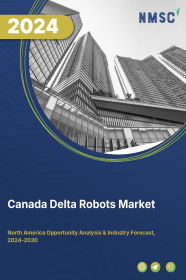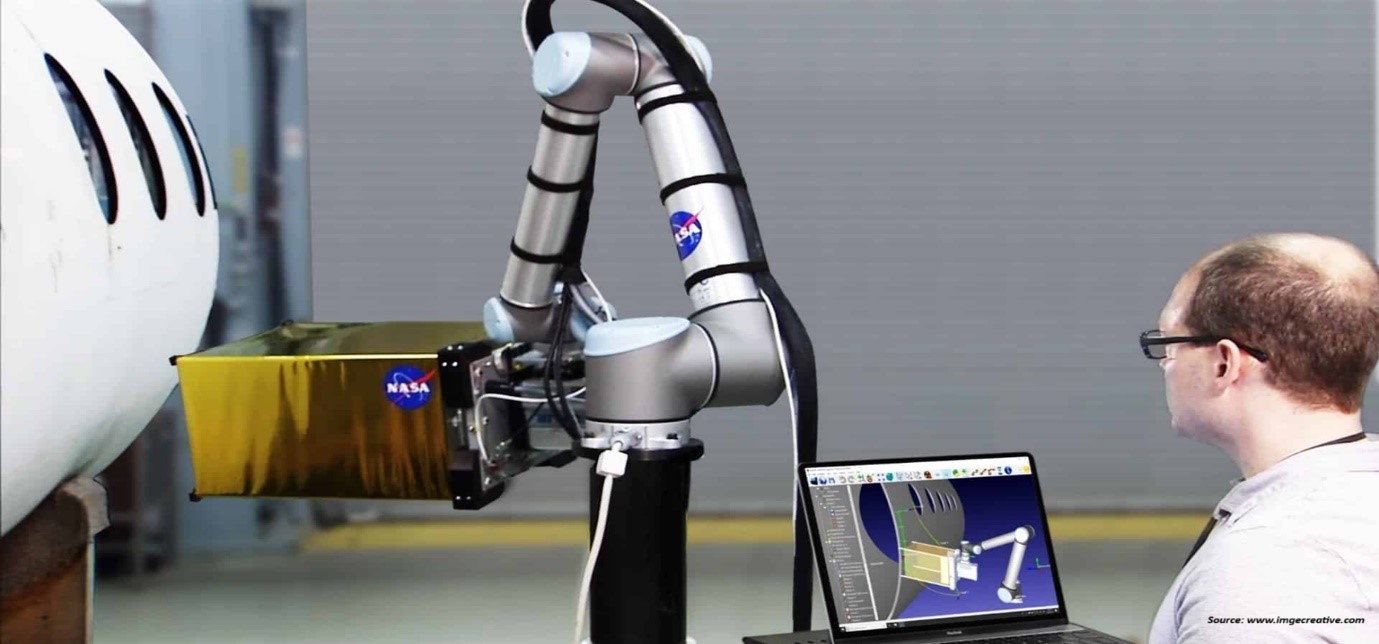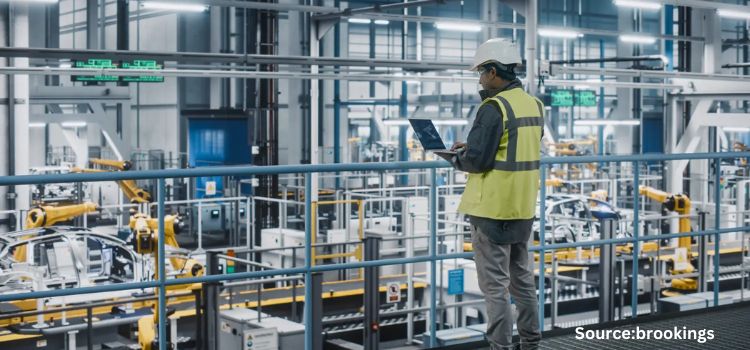
Canada Delta Robots Market by Axis Type (Double Axis, Three Axis, Four Axis, Five Axis, and Six Axis), by Payload Capacity (Up to 3 Kilogram, 3.1 to 8 Kilogram, 8.1 to 15 Kilogram, and More than 15 Kilogram), by Version Environment (Standard and Hygiene), by Application (Assembly, Pick & Place, Material Handling, Palletizing/Packaging, and Others), by Industry Vertical (Electronics, Cosmetics, Food & Beverages, Pharmaceuticals, and Others) – Opportunity Analysis and Industry Forecast, 2023–2030
Industry: ICT & Media | Publish Date: 02-Dec-2024 | No of Pages: 74 | No. of Tables: 59 | No. of Figures: 28 | Format: PDF | Report Code : IC893
Market Definition
Canada Delta Robots Market was valued at USD 28.3 million in 2022, and is predicted to reach USD 55.17 million by 2030, with a CAGR of 7.59% from 2023 to 2030. Delta or parallel robots are highly specialized robotic systems characterized by their unique mechanical structure and exceptional precision. These robots have three or more arms connected to a common base, forming a parallel mechanism that gives exceptional precision and structural stability.
Delta robots are renowned for their remarkable speed, agility, and accuracy, making them ideal for a wide range of high-speed, precision applications in manufacturing, electronics, food & beverage, pharmaceuticals, and others. The design of delta robots allows them to move with incredible precision in all three dimensions, such as assembly lines, pick-and-place operations, and intricate manufacturing processes. Making them particularly well-suited for tasks involving pick and place, assembly, packaging, and material handling.
Their parallel kinematic structure, a robotic system design where multiple limbs work parallel to control end-effector motion, enabling precise coordination and control, provides superior rigidity and stability, ensuring consistent and reliable performance. Depending on their specific configuration, they can handle various payloads, ranging from lightweight items to heavier components.
Thus, delta robots are a class of robotic systems renowned for their speed, precision, and versatility. Their unique parallel structure, including rigidity, speed, and stability, makes them a preferred choice for various high-speed automation tasks across multiple industries, contributing to increased efficiency and precision in modern manufacturing and assembly processes.
Government Initiatives in Canada Stimulate Robotics Adoption and Market Growth
The rising initiatives taken by the government in Canada increase the adoption of robotics in the industries, which in turn drives the growth of the market. For instance, in April 2023, the Canadian government invested about $1.4 billion in funding towards research in emerging technologies such as delta robots, artificial intelligence, robotics, carbon capture, and healthcare. This funding will be distributed among 11 universities, which in turn boosts the market growth.
Also, the increasing adoption of electric vehicles (EVs) in Canada, driven by stringent government regulations and initiatives, directly impacts the demand for advanced manufacturing technologies in the EV industry, including delta robots.
Rising Demand for Delta Robots in Pharmaceutical and Healthcare Industries in Canada
Delta robots play a crucial role in the pharmaceutical manufacturing sector. They handle tasks such as drug assembly, sorting, and quality control. With the pharmaceutical and healthcare sectors in Canada experiencing growth due to factors like an aging population and heightened healthcare needs, there is a clear indication of a substantial rise in demand for automation solutions, including delta robots.
Delta robots are known for their precision, reliability, and efficiency, making them indispensable in ensuring the accuracy and consistency required in pharmaceutical production. This trend reflects a broader industry shift towards automation, aiming to enhance pharmaceutical manufacturing capabilities and meet stringent regulatory standards. Ultimately, this contributes to the delivery of safe and high-quality medical products to the market.
The High Cost of Delta Robots Hinders Market Growth in Canada
The high cost of delta robots presents a substantial restraint on the market's growth. These robots, known for their precision and efficiency, often come with a price tag that can be a barrier to adoption for many businesses, particularly small and medium-sized enterprises (SMEs).
Additionally, the extended return on investment (ROI) period due to high upfront costs can deter companies seeking more immediate cost savings and efficiency improvements. This situation hinders market growth and contributes to market concentration, with only larger corporations able to afford and benefit from this advanced automation technology.
Integration of Advanced Technologies to Enhance Precision represents a significant opportunity for the Market
Integrating advanced technologies, such as computer vision and artificial intelligence (AI), to enhance precision represents a significant opportunity for the delta robot market. These cutting-edge technologies enable delta robots to operate more accurately and efficiently, opening up new avenues for applications across various industries.
The integration of computer vision and AI not only enhances precision but also improves overall productivity and reduces errors in manufacturing processes. This can result in cost savings, higher product quality, and increased competitiveness for businesses that leverage delta robots with these advanced technologies. As industries continue to embrace automation and demand higher precision and flexibility, the delta robot market is poised to benefit significantly from the opportunities created by integrating computer vision and AI.
Competitive Landscape
The Canada Delta Robots industry includes several market players such as ABB Ltd., Fanuc Corporation, Kawasaki Heavy Industries Ltd, Yaskawa Electric Corporation, FESTO, Weiss GmbH, Omron Corporation, IGUS GmbH, Cama Group, and KUKA AG.
Key Benefits
-
The Canada Delta Robots market report provides a quantitative analysis of the current market and estimations through 2023-2030 that assists in identifying the prevailing market opportunities to capitalize on.
-
The study comprises a deep dive analysis of the market trend including the current and future trends for depicting the prevalent investment pockets in the market.
-
The information related to key drivers, restraints, and opportunities and their impact on the market is provided in the report.
-
The competitive analysis of the market players along with their market share in the Canada Delta Robots market.
-
The SWOT analysis and Porter’s Five Forces model are elaborated in the study.
-
Value chain analysis in the market study provides a clear picture of the stakeholders’ roles.
Canada Delta Robots Market Key Segments
By Axis Type
-
Double Axis
-
Three Axis
-
Four Axis
-
Five Axis
-
Six Axis
By Payload Capacity
-
Upto 3 Kilogram
-
3.1 to 8 Kilogram
-
8.1 to 15 Kilogram
-
More than 15 Kilogram
By Version Environment
-
Standard
-
Hygiene
By Application
-
Assembly
-
Pick & Place
-
Material handling
-
Palletizing/ Packaging
-
Primary
-
Secondary
-
-
Others
By Industry Vertical
-
Electronics
-
Cosmetics
-
Food & Beverages
-
Pharmaceuticals
-
Others
Key Players
-
ABB Ltd.
-
Fanuc Corporation
-
Kawasaki Heavy Industries Ltd.
-
Yaskawa Electric Corporation
-
FESTO
-
Weiss GmbH
-
Omron Corporation
-
IGUS GmbH
-
Cama Group
-
KUKA AG
REPORT SCOPE AND SEGMENTATION:
|
Parameters |
Details |
|
Market Size in 2022 |
USD 28.3 Million |
|
Market Volume in 2022 |
1229 Units |
|
Revenue Forecast in 2030 |
USD 55.17 Million |
|
Growth Rate |
CAGR of 7.59% from 2023 to 2030 |
|
Analysis Period |
2022–2030 |
|
Base Year Considered |
2022 |
|
Forecast Period |
2023–2030 |
|
Market Size Estimation |
Million (USD) |
|
Growth Factors |
Government initiatives. The increasing demand for delta robots within the pharmaceutical and healthcare sectors. |
|
Companies Profiled |
10 |
|
Market Share |
Available for 10 companies |
|
Customization Scope |
Free customization (equivalent up to 80 working hours of analysts) after purchase. Addition or alteration to country, regional, and segment scope. |
|
Pricing and Purchase Options |
Avail customized purchase options to meet your exact research needs. |

















 Speak to Our Analyst
Speak to Our Analyst





















